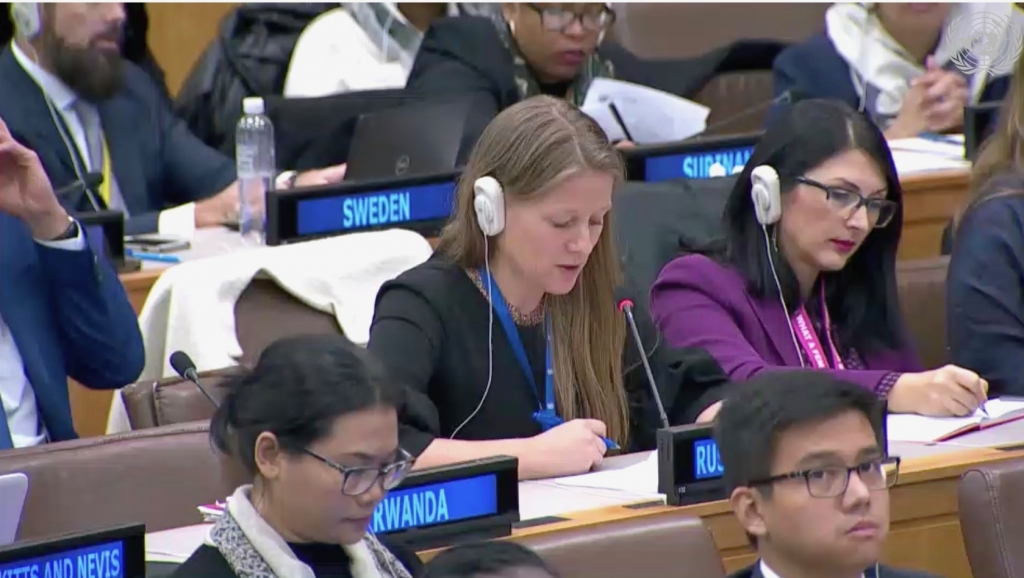Statement by representative of the Russian Federation Maria Zabolotskaya at the Third Committee of the UN General Assembly at presentation of Russian draft resolution "Countering Use of Information and Communication Technologies for Criminal Purposes"
Mr. President,
Distinguished colleagues,
Thematic discussion on cybercrime held in the framework of the Third Committee of the General Assembly in accordance with the first resolution on this matter that the global community adopted last year clearly indicated that the current efforts at this track are insufficient. The world faces rapid growth of activity of cyber-criminals and of the damage they inflict that is already worth trillions USD yearly. According to the estimates that UN Secretary-General A.Guterres presented at the 27th session of the UN Commission on Crime Prevention and Criminal Justice (Vienna, May, 2018), in 2018 the damage amounted to 1.5 trillion USD. The forecast for this year is 2.5 trillion.
No country of the world, no matter what level of technical development it might have, can counter these threats when standing alone. Largely it has to do with the fact that cybercrime is a transnational phenomenon that has a trans-border nature. As of now, regional measures do not suffice to counter this. Many countries either are still on their way to building specialized legislation to counter cybercrime or have none of such legislation at all. Despite the scale of the problem, the global community has no full-fledged international legal basis for cooperation or at least any common language and terminology on that matter.
In this context, it is absolutely clear that we need a universal international legal mechanism in this area. The idea to elaborate such a document was first articulated in the final declaration of the 12th UN Congress on Crime Prevention and Criminal Justice (Brazil, 2010).
We believe what can become such a tool is a Convention on Countering Cybercrime prepared under UN auspices. Such convention should account for the reality of all countries without exception, base on principles of sovereign equality of sides and non-interference in internal affairs of states, be void of drawbacks that are characteristic of other instruments, and consider modern trends in order to ensure more rapid and effective fight against cybercrime.
This path that starts with an idea and leads to creating a universal toolkit is well-established. The UN Convention against Corruption (UNCC), the UN Convention against Transnational Organized Crime (UNCTOC) walked the same path. They were developed by UN specialized committees that had been created specifically for these purposes and based upon the existing instruments. It is the very path that we proposed in our new draft resolution “Countering Use of Information and Communication Technologies for Criminal Purposes”, because this is a verified method that is available to everyone and that lets take into account opinions of all UN member states, their expertise, legal basis and national and regional specifics.
The preamble almost repeats the text of the first of its kind UNGA resolution on this matter that was adopted by the global community last year (#73/187 of 17 December 2018). This year delegations of nearly all countries of the globe contributed to this text by small yet positive additions. The operative part of the draft is based on the already tested decisions, as was the case with UNCTOC and UNCC, whereby the main goal is to establish an open-ended specialized committee to develop a universal toolkit in this area.
In order to define modalities of the work of this platform the delegations are offered to get together in 2020 in New York. The work on the text of the convention should start in 2021, once the mandate of the Intergovernmental Expert Group on Cybercrime that convenes in Vienna expires and the Group adopts its final recommendations. We believe those recommendations should be reflected in prospective draft convention. The two processes will not complement each other.
Thus, the mandate of the Specialized Committee will be limited to elaborating a universal UN toolkit. We also think it reasonable to base the future convention on instruments and best practices on countering cybercrime that once proved effective. This initiative by no means creates any impediments for regional agreements, including the Budapest Convention, and the national legislation. On the contrary, it will enhance capacity of states to combat cybercrime, increase the overall global potential in this area, and make it possible to harmonize international cooperation.
About 30 countries have become co-authors of our initiative. This proves that there is growing demand for a convention that should be universal and accessible to every country. To our regret, issues of countering cybercrime have always been highly politicized. It has never been a compromise track. Therefore, we suggest that UN dialogue on this matter should be transferred to purely practical dimension, which is the area of criminal law.
It becomes clear that half-measures are no longer enough. Cyber-criminals will not wait. That is why it is crucial to get down to working on universal agreements to be made in a non-politicized, non-confrontational, and transparent manner.
We call upon UN member states to support and co-author this initiative. It is our firm conviction that we can come up with positive and mutually beneficial solutions only when acting together.
Thank you.
